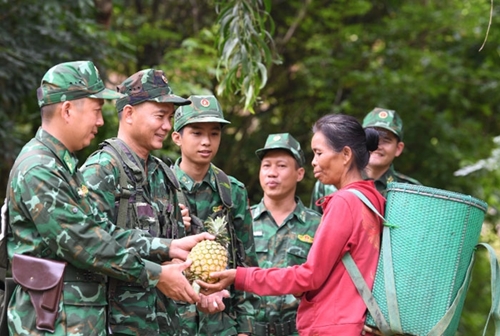1. “Uncle Ho’s soldiers” is the name that Vietnamese people have called Vietnamese troops since the first months of the resistance war against the French colonialists. Though time flies, good qualities of Uncle Ho’s soldiers keep shining, entering social life and becoming the culture of Uncle Ho's soldiers, which contains the national cultural identity, and the harmony between tradition and modernity. This is also the spiritual beauty of the Vietnamese people and the Vietnamese military which was created by the people, fights, sacrifices, and devotes itself for the people.
Since its inception as the Vietnam Dissemination and Liberation Armed Team with over thirty members and few and rudimentary weapons, the Vietnam People’s Army, over the past 80 years of construction, combat, and development, directly educated and trained by the Communist Party of Vietnam and President Ho Chi Minh, has shown that it deserves to be the key force in defending the Fatherland, protecting the people, and becomes a reliable political force, an elite combat force of the Party, State, and people, contributing to the glory of the Fatherland.
    |
 |
|
Sentiments of Van Kieu ethnic people in Lao Bao townlet, Huong Hoa district, Quang Tri province to troops of the Border Post of Lao Bao International Border Gate on the patrol route |
Basically, the military was built on the basis of Uncle Ho’s soldiers’ qualities, which are a system of standards and personal values of revolutionary soldiers. In fact, military troops have gained special trust and love by the people, both in wartime and peacetime.
In wartime, a person walking alone on a long road in the dark was often afraid and terrified. However, when he saw a group of soldiers marching towards him, he could feel more confident to go ahead. In peacetime, people know that they could trust the person in military uniform wearing a hat with a five-pointed yellow star with a mature demeanor in a crowd.
2. Unlike many countries in the world that have mercenary militaries or whose militaries fight primarily for the benefit of the ruling class, the Vietnam People’s Army was created by the people and it combats, makes sacrifices and devotes itself for the people’s peaceful and happy life. When the Fatherland was invaded, the military volunteered to fight the invaders. Wherever they go, troops always receive support from locals.
The solidarity between Vietnamese troops and people is time-tested, creating invincible strength. The Tran Dynasty which fought against the Mongol-Yuan invaders three times in the 13th century had a pro-people strategy. Dien Hong Conference was a shining symbol of the will to unite troops and people, mobilizing the invincible strength of the people to fight and defeat the invaders.
In the resistance wars against the French colonialists and the U.S. imperialists, the close-knit ties between troops and people were raised to a new height of great national unity. People enhanced production to support troops. They voluntarily protected troops when the enemy hunted them. People enthusiastically cleared the way for troops to go. That was a vivid manifestation of the relationship between troops and people, a source to create the miraculous strength of the military.
The close ties between troops and people have also become a source of inspirations for many literary and art works.
Perhaps, hardly is there a military that the people have such great affection for like Vietnamese revolutionary military. The close, loyal, sharing affection between troops and people has become a selfless, pure, and beautiful feeling.
3. It is not surprising that revolutionary soldiers are grateful to and respect the people as their parents and loved ones, so they voluntarily fight and sacrifice themselves to protect people’s lives and assets. Not only in war but also in other difficult times of the country, the image of troops acting for the people shines even brighter.
During the fight against the COVID-19 pandemic, thousands of troops braved danger to stand side-by-side with people to fight the pandemic like fighting an enemy. During the flash floods and landslides in the Central region, hundreds of troops braved the rain and floods to search for the missing, conduct rescue activities. Some lost their lives while assisting the people.
Troops are seen in almost all areas of life, from mass mobilization work, hunger eradication, poverty reduction, new-style rural area building, to political system building, defense consolidation, socio-economic development in remote, mountainous, border areas and on islands. In a visit to a Dao village in Lieu Binh border district, Quang Ninh province, the author of this writing, Eminent Artist Khuc Ha Linh, former Rector of Hai Duong provincial Art and Culture College, witnessed touching stories. The soldiers having lived in hard conditions for many years voluntarily contributed working hours and money to building concrete roads, clinics, schools, bringing electricity to villages, and bringing the light of civilization to the border locality. Troops also guided locals on how to grow short-term fruit trees and perennial trees and together with the locals built a new cultural life and eliminated bad customs. As a result, local people knew how to combine economic development with defense and security consolidation and enhancement, contributing to building a border area of peace and friendship.
It can be said that the solidarity and close bond between troops and people is as sparkling as a pearl, helping make the image of Uncle Ho's soldiers shine.
In peacetime, military troops must bear in mind the lesson that “people are the root,” because that is the truth and also morality. The qualities of Uncle Ho's soldiers are built from the brave fighting spirit, not afraid of sacrifice and hardship of generations of officers and soldiers trained by the Party and Uncle Ho and protected and loved by the people. Therefore, troops must always cherish, preserve and promote those values to become cultural heritage of the nation, worth the trust, love, and expectations of the Party, State, and people.
Translated by Mai Huong